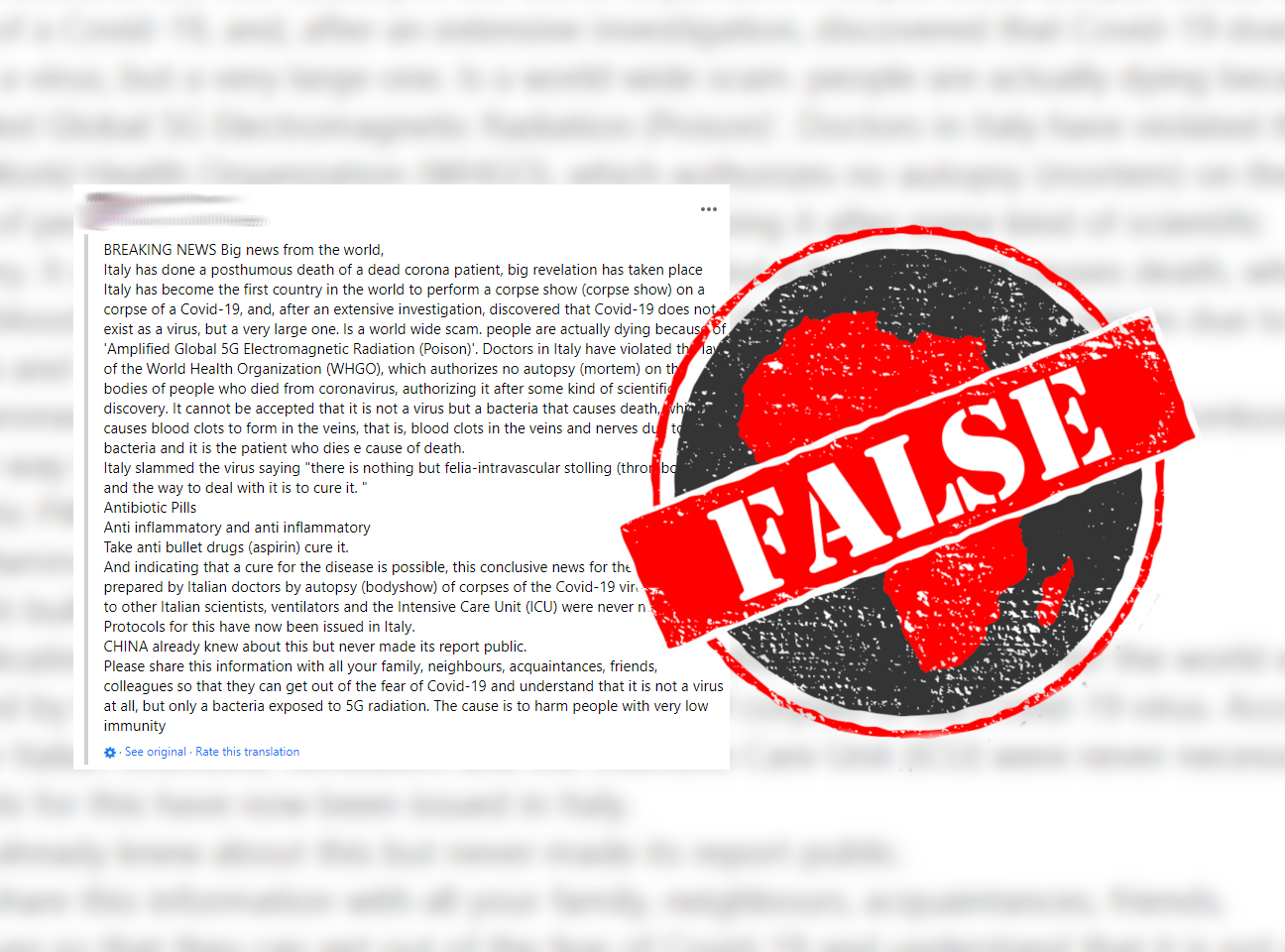A message posted on Facebook in South Africa claims, in Afrikaans, that “Italië het die eerste land ter wêreld geword wat 'n lykskouing (lykskouing) op 'n lyk van 'n Covid-19 uitgevoer het.” This roughly translates as: “Italy became the first country in the world to perform an autopsy on a corpse that had died of Covid-19.”
This, the January 2022 post claims, led to a “groot openbaring” – a “great revelation”.
Analysis after the autopsy supposedly revealed that “dit nie 'n virus is nie, maar 'n bakterie wat die dood veroorsaak” (“it is not a virus, but a bacterium that causes death”).
Although the post claims to be “BREKENDE NUUS” (“BREAKING NEWS”), this false claim is almost as old as the Covid-19 pandemic itself.
The message also includes other false claims debunked months or years before it was shared, such as that the World Health Organization (WHO) has banned autopsies on Covid-19 patients, that the disease can be treated with aspirin, and that Covid-19 is caused by 5G communications technology.

New year, same old claims!
A quick Facebook search for the message turns up plenty of nearly identical copies. Most of them were posted in January 2021. The same “news” seems to have been “breaking” for more than a year.
There are plenty of earlier examples too. Africa Check first debunked the “first autopsy” claim back in May 2020. In June 2021 we debunked it again when a nearly identical version claimed it was Russia – rather than Italy – that had performed the first autopsy of a Covid-19 patient.
Other fact-checking organisations have also looked into the claim. It has been debunked by USA Today, Check Your Fact, Reuters (which also checked the Russian version of the claim), and many more.
Let’s go over the facts again.
The WHO does not forbid autopsies on Covid-19 patients, and researchers from several countries have released Covid-19 related research based on the results of autopsies.
Viruses and bacteria are very different things, although both can cause disease.
Covid-19 is not caused by a bacterium. It is caused by a coronavirus named Sars-CoV-2, which has been fully identified and even photographed in extremely fine detail under powerful microscopes.
Aspirin is not a cure for Covid-19. Its anticoagulant effects mean that it has been considered as a potential medication for managing some side-effects of Covid-19. But scientific studies have been inconclusive about the value of aspirin as a Covid-19 treatment. Public health organisations have recommended that Covid-19 patients do not take aspirin unless it has been prescribed for some other medical condition.
Covid-19 is not caused by 5G communication technology. For more information, read Africa Check’s factsheet on 5G, which explains what it is and answers common questions about the technology.
In short, 5G uses particular frequencies of electromagnetic radiation (light), which are not dangerous to humans except at intensities far higher than those used in 5G technology. It cannot cause Covid-19, and the disease has appeared in many countries that don’t have 5G infrastructure.
Since all of these claims have been repeatedly debunked in the past (including by Africa Check), they are relatively easy to check. Anyone sharing this disinformation could have avoided it with a quick internet search. For advice on how to avoid sharing claims like this, read our guide to vetting information during a pandemic.
Republish our content for free
For publishers: what to do if your post is rated false
A fact-checker has rated your Facebook or Instagram post as “false”, “altered”, “partly false” or “missing context”. This could have serious consequences. What do you do?
Click on our guide for the steps you should follow.
Publishers guideAfrica Check teams up with Facebook
Africa Check is a partner in Meta's third-party fact-checking programme to help stop the spread of false information on social media.
The content we rate as “false” will be downgraded on Facebook and Instagram. This means fewer people will see it.
You can also help identify false information on Facebook. This guide explains how.





Add new comment